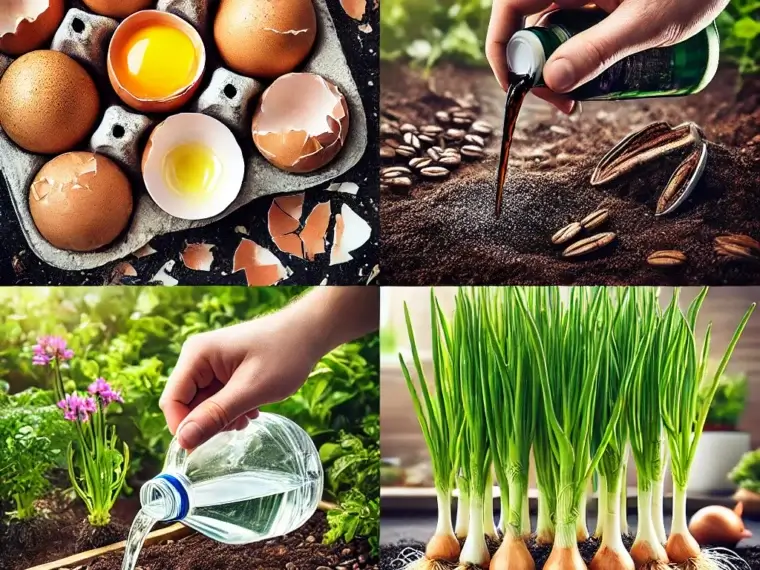Gardening can be both rewarding and therapeutic, but it also comes with challenges. Whether you’re a beginner or an experienced gardener, these 20 top gardening hacks will help you improve plant growth, repel pests, and make the most of your garden with simple, natural solutions.
1. Eggshells as Fertilizer
Eggshells are rich in calcium, which strengthens plant cell walls. Crushed eggshells can be mixed into the soil or used as mulch to enhance plant growth, especially for tomatoes, peppers, and eggplants.
✅ How to use: Dry and crush eggshells, then sprinkle them around plants or mix into compost.
2. Coffee Grounds to Enrich Soil
Used coffee grounds are packed with nitrogen, a vital nutrient for plant growth. They also improve soil texture and attract earthworms, which aerate the soil.
✅ How to use: Mix coffee grounds into compost or sprinkle a thin layer around acid-loving plants like tomatoes, roses, and blueberries.
3. Vinegar to Kill Weeds
Vinegar is a natural and eco-friendly weed killer. The acetic acid in vinegar dries out unwanted plants without harming the environment.
✅ How to use: Spray undiluted white vinegar directly onto weeds on a sunny day. Avoid spraying near desired plants.
4. Kitchen Scraps to Grow New Plants
You can regrow many vegetables from kitchen scraps, reducing waste while keeping your garden stocked with fresh produce.
✅ How to use: Place scraps like onion bottoms, carrot tops, or celery bases in water until roots develop, then transplant into soil.
5. Epsom Salt for Healthier Plants
Epsom salt contains magnesium and sulfur, which improve seed germination, chlorophyll production, and nutrient absorption.
✅ How to use: Dissolve 1 tablespoon of Epsom salt in 1 gallon of water and use as a foliar spray every two weeks.
6. Banana Peels for Natural Fertilizer
Banana peels are rich in potassium and phosphorus, essential for plant growth.
✅ How to use: Bury banana peels in the soil near the roots of flowering plants and vegetables.
7. Use Cinnamon to Prevent Fungal Diseases
Cinnamon has natural antifungal properties that prevent damping-off disease in seedlings.
✅ How to use: Sprinkle cinnamon on soil or plant wounds to stop infections.
8. Milk Spray for Powdery Mildew
Milk has natural antifungal properties that help control powdery mildew on plants like squash and roses.
✅ How to use: Mix one part milk with two parts water and spray on affected plants weekly.
9. Newspaper and Mulch for Weed Control
Layering newspaper under mulch blocks weeds while keeping the soil moist and cool.
✅ How to use: Place wet newspaper sheets around plants, then cover with mulch.
10. Use Baking Soda for Sweeter Tomatoes
Baking soda reduces soil acidity, which can result in sweeter tomatoes.
✅ How to use: Sprinkle a small amount around tomato plants without touching the stems.
11. Grow Plants in Toilet Paper Rolls
Toilet paper rolls make excellent biodegradable seedling starters.
✅ How to use: Fill rolls with soil, plant seeds, and transplant them into the garden when ready.
12. Hydrogen Peroxide for Root Health
Hydrogen peroxide aerates the soil and kills harmful bacteria, preventing root rot.
✅ How to use: Mix 1 part 3% hydrogen peroxide with 4 parts water and water plants occasionally.
13. DIY Self-Watering System with Plastic Bottles
A slow-release watering system keeps plants hydrated, especially during hot weather.
✅ How to use: Poke holes in a plastic bottle, fill it with water, and bury it near plant roots.
14. Use Egg Cartons for Seed Starters
Egg cartons are biodegradable and make great seedling containers.
✅ How to use: Fill each compartment with soil, plant seeds, and transplant when seedlings grow.
15. Grow Companion Plants to Repel Pests
Certain plants naturally repel insects and pests when planted together.
✅ Best combinations:
- Basil with tomatoes (repels aphids)
- Marigolds with vegetables (deters nematodes)
- Lavender with roses (keeps mosquitoes away)
16. Use Plastic Forks to Keep Animals Away
Plastic forks placed around plants deter rabbits, cats, and other animals from digging up your garden.
✅ How to use: Stick plastic forks into the soil with the tines facing up.
17. Reuse Cooking Water for Plants
Water used for boiling vegetables contains nutrients that plants love.
✅ How to use: Let the water cool and use it to water plants instead of wasting it.
18. Place a Sponge in Pots for Moisture Control
A sponge at the bottom of a pot absorbs excess water and slowly releases it, preventing overwatering and root rot.
✅ How to use: Place a clean sponge in the bottom of the pot before adding soil and plants.
19. Use Sugar to Revive Wilting Plants
Sugar provides a quick energy boost to struggling plants.
✅ How to use: Mix 2 tablespoons of sugar with 1 quart of water and pour at the plant’s base.
20. Hang CDs to Deter Birds
Old CDs reflect light, scaring birds away from fruit trees and vegetable gardens.
✅ How to use: Hang CDs from branches with string to keep birds at bay.
By using these 20 simple gardening hacks, you can improve plant health, boost productivity, and make gardening easier and more efficient. Try them out and watch your garden thrive! 🌱🌿🌻
Which of these gardening hacks have you tried? Let us know in the comments!
